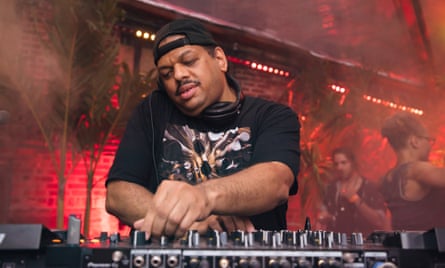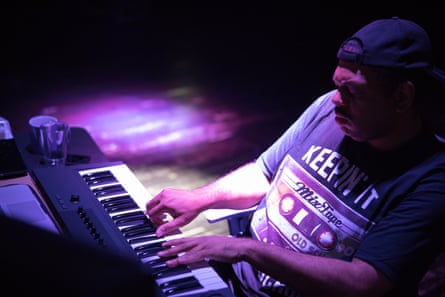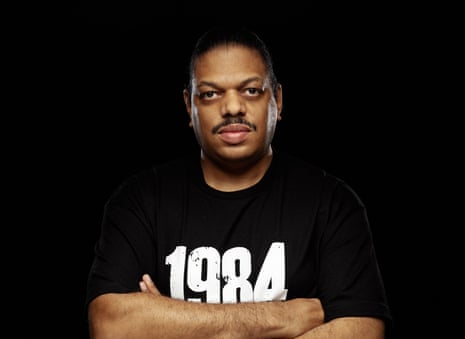One day in 2018, Kerri Chandler was in New York City trying to track down some of his old haunts: famous clubs where he had DJ’d with mentors such as David Mancuso, Frankie Knuckles and Larry Levan. He stopped on one street in front of a familiar building, scaffolded and covered in netting, and peeked through. “They just happened to be gutting the Paradise Garage,” he says with a shudder. “I put my hands over my face. I couldn’t believe they did that. I’m glad I have it as a memory, but if you haven’t seen pictures of it, you would never know it existed.”
Chandler knows the bittersweet aftertaste that club closures can leave. The deep house pioneer was 13 when he began warming up for his DJ father in New Jersey nightclubs, balancing on milk crates to reach the turntables. The first time he took a flight was to play London’s Ministry of Sound at 19. He spun at the Paradise Garage, one of New York’s greatest clubs, just before it shut in 1987. He’s seen too many beloved dancefloors come and go. “It’s like watching your friend die.”
Since those heady days, the 53-year-old has sent music signals into space, designed a laser harp and released records by jazz-funk great Roy Ayers and deep house disciple Jamie Jones on two of his labels, Madhouse and Kaoz Theory. Spaces and Places, his first solo album in 14 years, is a love letter to the global dancefloor: 24 tracks recorded at 24 of the world’s best clubs, including Printworks in London, Watergate in Berlin and Output in NYC. Chandler turned each club into a temporary studio and created songs best suited to each club’s distinct personality, from disco to deep house.
Some of the spaces featured on the album have, indeed, since shut. News of the potential Printworks closure was a particular shock (though it still appears to be open for the winter). Chandler’s track Never Thought, a jumpy jazz-laced house heater, was composed on a piano stationed in its green room, which had been signed by practically every DJ who had played there. He hopes that listeners can “go back and check these places, if they’re still around”.

Spaces and Places arrives as house music is back on the pop culture agenda. Two of 2022’s biggest releases, Beyoncé’s Renaissance and Drake’s Honestly, Nevermind, bounce to a four-four beat. Both stars have been said to be reclaiming house music’s Black roots, despite originators like Chandler – who only stopped working briefly when his two children were born – plugging away for decades. But he sees it another way. “A lot of us feel that house music never left.” He adds that he knows “people might be angry or mad” about talk of Beyoncé and Drake saving house music, “but if it crosses over to what we’re doing and keeps our scene alive, that’s wonderful. They might bring the next generation, and maybe we can all grow together.”
When Chandler was a young DJ in East Orange, New Jersey, he had high hopes for the genre’s nationwide potential but “hip-hop became what I thought house should have been” – the dominant musical language of the US. House found its way across the Atlantic and was embraced by Europe. Beyond the odd 90s hit, he is still unsure why it didn’t take off in the US and trigger a second summer of love: “I don’t know if people kept the ‘disco sucks’ thing in their heads or something.”
East Orange wasn’t exactly an idyllic place for a kid, but “it had a hell of a lot of talent”, says Chandler. His mother used to babysit for the family of Steve Washington, of funk group Slave; Whitney Houston was hanging around, as were hip-hop trio Naughty By Nature. Aged 14, Chandler would go into the studio with his father’s friends, Kool and the Gang, and watch them perfect their disco hit Ladies’ Night. Music was a ticket out. “Where we lived, you only had three choices: drugs, gangs or music. There’s a saying Naughty By Nature has: if you leave East Orange without getting stabbed or shot, you’ll be all right.”
Chandler left and toured far and wide, but New Jersey remained a cornerstone of his style. His free-ranging eclecticism – a love of jazz, funk, soul, rap and especially disco that came from his father – got him noticed by the resident of popular local nightspot Club Zanzibar, Tony Humphries, who played Chandler’s tracks on his radio show. Zanzibar was a mecca for house, and the Jersey sound – which favoured soulful, gospel influences – was king. For Chandler, it was also the site of unfathomable tragedy: his girlfriend Tracy was raped and murdered outside the club.
She had been a huge house fan, and her death inspired Chandler to get out his drum machine. “I’d never really thought about making house music, but I sat down and wrote Get It Off. It was me trying to get all of these things off of my mind. There’s a part in the song where it sounds like someone takes a record and rips it. That’s how it felt, like somebody ripped my entire life.”
It proved to be a turning point in his career: “Right after that, I got signed to Atlantic Records.”
Ever since Tracy’s death, Chandler’s songs have come from a personal place. Spaces and Places includes a track featuring his gospel singer cousin, Aaron Braxton, in tribute to Braxton’s father, Chandler’s late uncle. Another, Dirty, was recorded at Paris’s Rex Club and features his friend, French producer DJ Deep, and Deep’s son. The Rex Club was instrumental in bringing American pioneers to Europe once house music exploded there in the 90s. It’s also where Chandler went viral in 2013, when he was filmed telling the audience, in a flurry of expletives, that he wouldn’t be playing anything commercial.
“I guess I was a little bit bold that night,” he says regretfully. “This girl comes up to me and says, ‘Do I have any EDM?’ I didn’t know what EDM was. I was like, I’m sorry, I don’t do drugs. Then she said, you know, like David Guetta or – I can’t remember their name, those three guys from Sweden [Swedish House Mafia]. And I just stopped the music. And I was like, look, anybody who wants to hear this EDM shit gotta go. I’m not playing any of that. By the time I landed home, my phone was on fire.”
Did he get any requests after that night? “I didn’t get a damn thing,” he laughs.

At that time, there were more white producers selling out stadiums than you could shake a glitter cannon at. But Chandler never felt like his contribution to house music history went underappreciated. “I’ve never gone starving in my life,” he says. “I’ve turned down more work than I could get. Honestly, thank God for that.”
Chandler says that nowadays he sees a lot of young DJs who just want to be famous. The real lifestyle is far less glamorous: “My life has been the hotel, back to the club. I got a choice between the brown salad or this hard sandwich. Back on the road again, don’t get to speak with my family.”
That reality hit hard when his father died suddenly in 2017. “We were getting ready to do one of his legendary birthday parties, he’d had some surgery and he was getting back to normal,” Chandler recalls. “He decided to go for a walk and get some groceries. I was touring, and I get a call from my sister. This man hit him with a truck as he was coming back from the store, and that was it. He was walking back across the street with a bag of popsicles and a half gallon of milk.”
“I couldn’t get back home in time,” he continues, his voice cracking. “I tried to get every flight but it was too late. Next thing I know, I’m arranging the funeral.”
Spaces and Places is Chandler’s first album since his father’s death. The release date has come forward so that it’s Grammy-eligible; if he makes the list, it will be the first time he has been nominated. It would be a fitting outcome for a producer who has always pushed forward and never stopped being curious during his 40 years in dance music. “Everyone seems to have that favourite time period,” he says. “I’m still looking for it.”

Comments (…)
Sign in or create your Guardian account to join the discussion